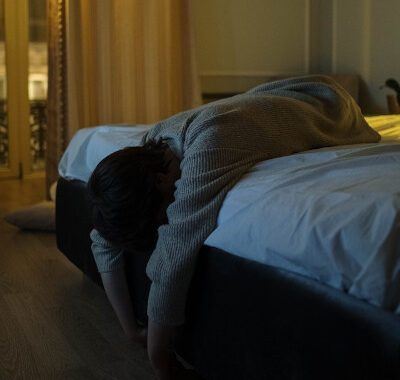
Overcoming Insomnia: What To Do When You Can’t Sleep
If you’re one of the millions of people in the United States who suffer from insomnia, you may discover that your mind is racing and your body is tossing and turning when you simply want to sleep. What do you do if you’re having trouble getting some shut-eye? Let’s take a look, starting with the basics.
Table of Contents:
What is insomnia?
No matter how exhausted they are, some people have trouble sleeping. Others wake up in the middle of the night and lie awake for hours, keeping a close eye on the clock. The difficulty to fall or stay asleep at night, resulting in unrefreshing or non-restorative sleep, is known as insomnia.
It’s a fairly frequent condition that affects your energy, emotions, and ability to perform throughout the day.
Insomnia is thought to be caused by a state of hyperarousal that prevents people from falling or staying asleep. Hyperarousal can be mental or physical, and it can be triggered by a variety of situations and medical conditions. Insomnia is characterized by the quality of your sleep and how you feel after sleeping, not by the number of hours you sleep or how quickly you doze off, since everyone needs a different amount of sleep.

What causes insomnia?
Insomnia can be caused by a variety of factors, and in many cases, multiple factors are involved. It can be caused by stress, irregular sleep schedules, lifestyle, mental health disorders, physical illness and pain, medications, neurological problems, and sleep disorders.
On top of this, insomnia can also induce or exacerbate other health problems, resulting in a complicated chain of cause-and-effect for insomnia.
Stress and anxiety
It’s no secret that stress may have a negative impact on your sleep. Every night, it’s the same routine: you eventually get into bed and close your eyes, but your mind continues to gallop.
Perhaps you’re thinking about the long list of unfinished tasks that need to be moved to tomorrow’s to-do list. Maybe it’s something else. Whatever it is, it may lead to a lot of unwelcome worries about going to bed over time.
Can’t find a comfortable position
The advantages of various sleeping positions vary. If you’re dealing with discomfort or other health issues, you may need to change your posture to assist in managing them.
While altering your normal sleep position may not be something you can achieve in one night, it is absolutely worth attempting. Taking the time to gradually teach yourself to sleep in a different posture might be the key to better sleep quality.
Nightmares
Nightmares can disrupt sleep, but only if they happen frequently or are very frightening.
Every now and again, most individuals encounter a bad dream or nightmare that has no discernible effect on their sleep quality.
However, if bad dreams occur frequently, they might constitute a sleep barrier. Some people have nightmares several times a week and/or numerous times in a single night, and it could cause sleep-based anxiety for some people.
Big life change
Divorce, the death of a loved one, or the loss of a career may all throw us for a loop. Happier experiences, such as getting married or starting a new profession, may sometimes be stressful.
As we go forward into the unknown, significant life transitions of any kind can be difficult to handle. Change may be frightening and confusing, even if it is expected or appreciated. And the more changes we have to deal with at the same time, the more difficult it becomes.
Too hot in the room
Many sleep specialists advocate sleeping in an environment that is between 60 and 67 degrees Fahrenheit. For the most restorative sleep, your body needs to cool somewhat at night, which is difficult in an overly hot environment, while a too-cold room will wake you up.
What are the types of insomnia?
Acute insomnia
Acute insomnia is defined as short-term insomnia that can last anywhere from a few days to a few weeks. It is the most common type of sleep deprivation.
Acute insomnia is also known as adjustment insomnia because it usually happens after a significant event, such as the death of a loved one or the beginning of a new career.
Chronic insomnia
Chronic insomnia is an issue that lasts a long time, sometimes for the rest of a person’s life. This kind of insomnia affects about 10% of the population. It might continue for months at a time before disappearing, or it can afflict a person intermittently for years.
Chronic insomnia can be caused by things like circadian rhythm disorder, sleep disorders, severe anxiety, extreme changes in sleep pattern and so on. This type of insomnia can lead to major health complications if left untreated.
What are the symptoms of insomnia?
The most common symptoms of insomnia are the following:
- Having a hard time concentrating
- Having a hard time remembering things
- Fatigue and malaise
- Increased risk for errors and accidents
- Excessive daytime sleepiness
- Hyperactivity, aggression, and similar behavioral problems
- Irritability and mood swings
- Impairments of social, professional, and academic abilities

How is insomnia diagnosed?
As researchers learn more about this sleep disorder, the criteria for diagnosing insomnia are always changing. In order to be diagnosed with insomnia, patients must report at least one of the following issues at least three nights a week, according to current criteria.
- Difficulty falling asleep
- Difficulty staying asleep through the night
- Constantly waking up before you want to
- Not wanting to go to sleep at reasonable hours of the night
Aside from these issues, patients that are diagnosed with insomnia also have to experience one or a few of the following problems during the day:
- Fatigue or malaise
- Trouble concentrating and holding attention
- Daytime sleepiness
- Impaired performance in social, academic, or professional matters
- Risk of errors and accidents
- Impulsivity, aggression, and hyperactivity
Despite enough opportunities for sleep and a sleep-friendly bedroom environment, these nocturnal and daytime symptoms must occur to receive a diagnosis. The patient will be diagnosed with chronic insomnia if symptoms occur at least three times per week for more than three months.
10 natural ways to help insomnia
Wake up at the same time each day
Although it may appear enticing, sleeping till noon on Saturday will simply throw off your biological clock and produce further sleep issues. Even on weekends, vacations, and other days off, going to bed at the same time every night and waking up at the same time in the morning helps to set your internal sleep/wake rhythm and decreases the amount of tossing and turning necessary to fall asleep.
Limit your naps
Avoid taking naps during the day even if you are very sleepy because they may interfere with your sleep schedule at night time. If you sleep during the day, you may not be able to fall asleep later that night at the desired time.
Eliminate alcohol and other stimulants
Caffeine and alcohol both have the potential to degrade the quality of your sleep or make it difficult to fall asleep. Caffeine should be avoided after mid-afternoon, and alcohol should be avoided after dinner. Drinking warm milk or chamomile tea before night is one of the most common insomnia cures.
Exercise
Previously sedentary people who undertook aerobic exercise four times a week increased their sleep quality from bad to good, according to researchers from Northwestern University’s Department of Neurobiology and Physiology. They also reported reduced tiredness, increased liveliness, and less depressed symptoms during the day. Just make sure you finish your workout a few hours before you go to sleep.
Avoid eating shortly before bed
Sleep quality may be influenced by what you eat and drink. A balanced diet offers numerous benefits, but don’t eat large meals within a couple of hours of going to bed.
Set up the room for sleeping
A room with a moderate temperature is more suitable for sleeping than one with a tropical temperature. The National Sleep Foundation recommends a temperature of roughly 65 degrees Fahrenheit. By achieving a balance between the thermostat, the bed covers, and your sleeping clothing, you lower your core body temperature and fall asleep more quickly and deeply.
Cognitive behavioral therapy
Cognitive behavioral therapy (CBT) teaches you how to notice and alter thoughts that interfere with your sleep. This sort of treatment can assist you in gaining control over or eliminating unpleasant thoughts and anxieties that keep you awake at night. It also helps in the development of excellent sleep habits and the avoidance of behaviors that prevent you from sleeping soundly.
Reduce stress
Stress may be robbing you of your ability to fall asleep if you find yourself laying in bed with your mind racing on a regular basis. When you’re tired from not getting enough sleep throughout the day, you’re more agitated, nervous, and angry. The entire stress-sleep situation may become a vicious cycle over time.
That’s why taking efforts to reduce your stress is so important for getting a better night’s sleep. You can try to reduce stress by journaling about your day in an effort to get rid of the negative energy that accumulated during the day or try progressive muscle relaxation.
You may fall asleep in a couple of minutes if you use the appropriate technique. Relaxation is one of the secrets to falling asleep more easily. According to research, the relaxation response is a physiological process that benefits both the mind and the body.
Dedicate a time for worrying before going to bed
Instead of rewinding the events of the day when you are already in bed, dedicate a time to it before you go to sleep. This way you will make sure that when you decide to sleep your mind is not going to wander off and think about what you could’ve done differently.
Use your bed for sleeping and having sex only
Working, eating, and watching TV should not be linked with your bed. If you wake up in the middle of the night, instead of getting on your laptop or watching TV, try something relaxing like meditation or reading until you fall back asleep.
Private in-home detox and addiction treatment services
Elite Home Detox has designed our in-home detox and addiction treatment services to accommodate the most discerning of patients – including executives, celebrities, and those who seek exceptional care and service – with complete discretion.
FAQ’s
How can I get rid of insomnia fast?
Try melatonin if you want to get rid of acute insomnia fast. It’s a hormone that helps your circadian rhythm and allows you to fall asleep much easier. It is produced in our brain as a response to darkness and it’s associated with sleeping so taking some melatonin should help you fall asleep much easier.
Why won’t my body let me fall asleep?
Anxiety, stress, and sadness are all variables that contribute to chronic sleeplessness. Anxiety, stress, and depression symptoms can all be exacerbated by a lack of sleep. Anger, anxiety, sadness, bipolar disease, and trauma are all common emotional and psychological causes.
How do you get over insomnia?
The natural way to get over insomnia is to stick to a sleep schedule, stay active, avoid naps and caffeine and avoid large meals and drinks before going to bed.
How can I naturally induce sleep?
If you are having trouble falling asleep and you want something natural to induce sleep you should try melatonin. Other natural things you can try are valerian roots, magnesium, lavender, passionflower and glycine.
How do you break the cycle of insomnia?
A few things you can do to break the cycle of insomnia is to avoid using electronics at night before sleeping. You should also exercise regularly and stay away from caffeine and caffeinated products, as well as alcohol, especially before bedtime. Try using soothing sounds to help you fall asleep and get as much natural light during the day as you can.



 Erika Kamish is a nationally board-certified physician assistant licensed by the California Physician Assistant Committee. With over 6 years of experience in addiction medicine and primary care, she reviews Elite Home Detox content for medical accuracy and patient-centered care.
Erika Kamish is a nationally board-certified physician assistant licensed by the California Physician Assistant Committee. With over 6 years of experience in addiction medicine and primary care, she reviews Elite Home Detox content for medical accuracy and patient-centered care.